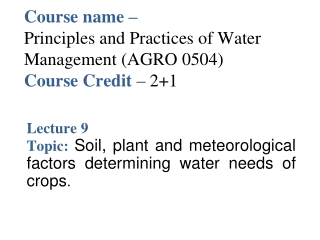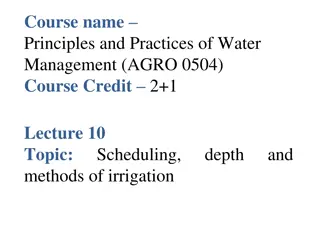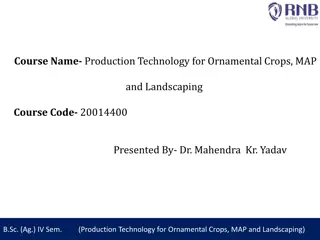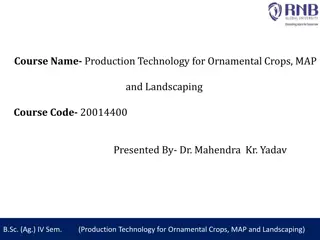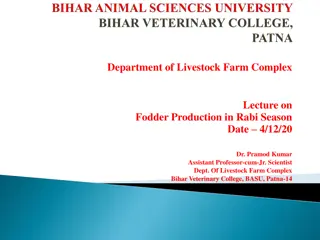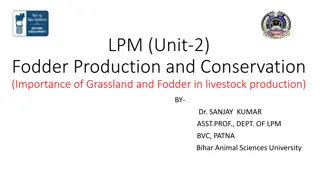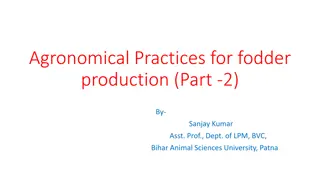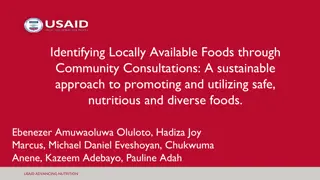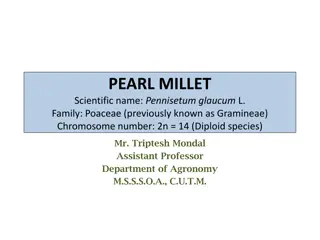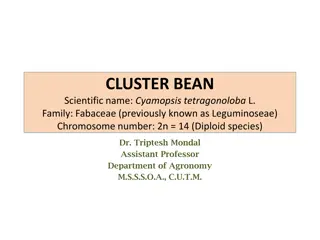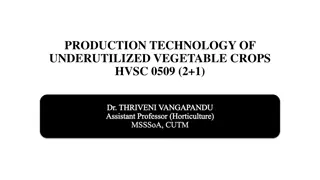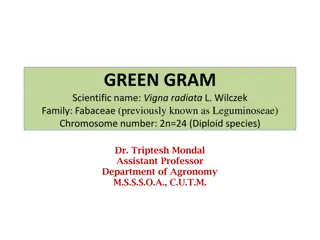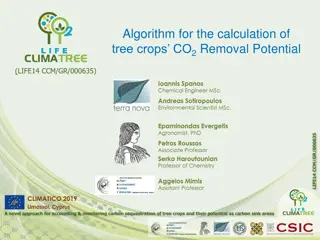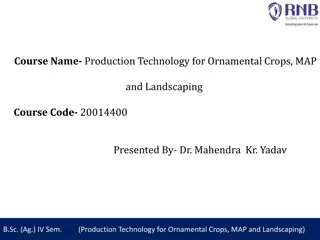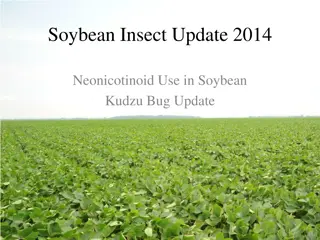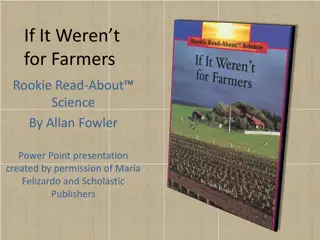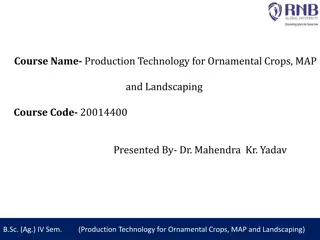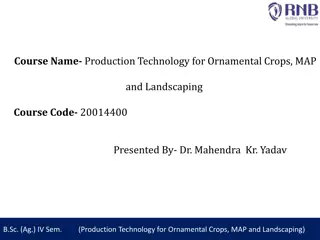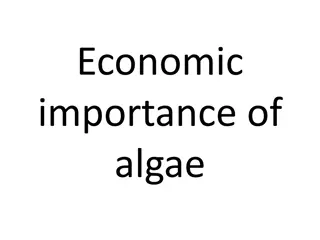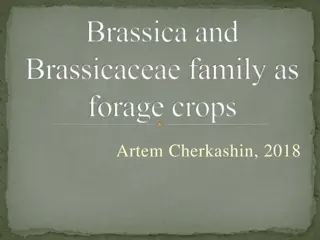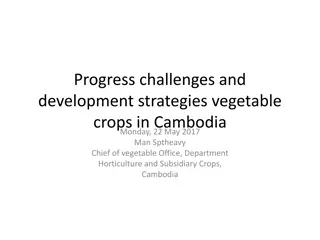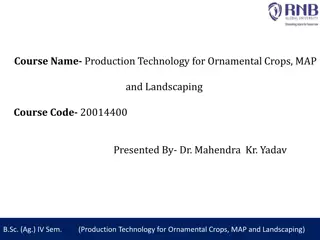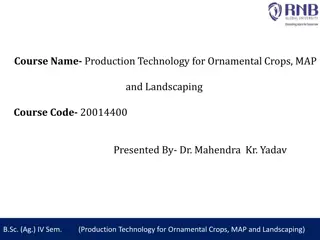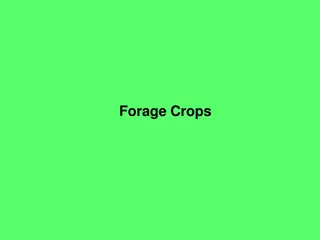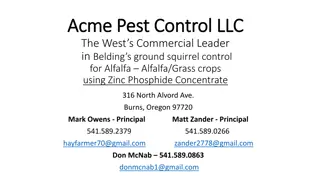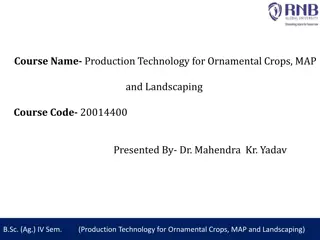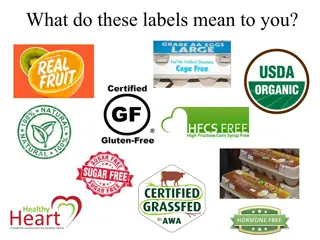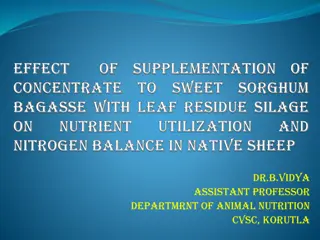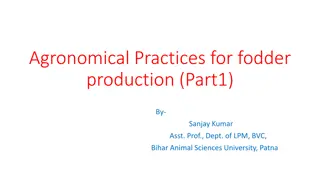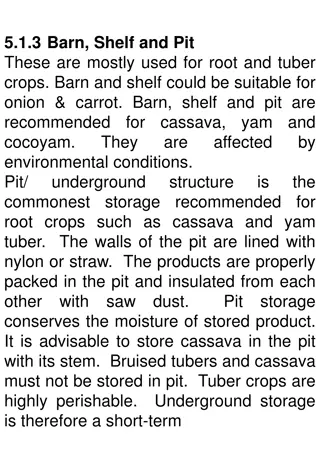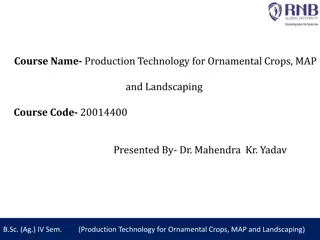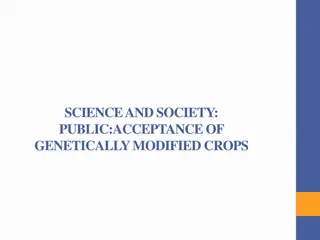Understanding Water Needs of Crops Based on Soil, Plant, and Climate Factors
How soil, plant, and meteorological elements impact water requirements of crops. Dive into the effects of temperature, solar radiation, pressure, wind, and humidity on crop production and growth.
2 views • 19 slides
Fodder production for small livestock units
Understanding the importance of feeds and fodders in animal production, adopting intercropping and backyard cultivation techniques to increase land productivity, and utilizing rabbits and poultry in traditional farming practices for resource-poor farmers.
0 views • 13 slides
Production Technology of Underutilized Vegetable Crops: Kale and Collards Overview
Explore the production technology and characteristics of underutilized vegetable crops Kale and Collards, including their origins, types, and growth habits. Learn about their nutritional value, cultivation, and unique features that make them ideal additions to kitchen gardens.
0 views • 13 slides
Recycling of Animal Washings and Waste in Fodder Production
Animal waste, including excrement and washings, can be recycled to enhance fodder production. By using animal waste as organic mulch or pesticides, farmers can improve soil fertility and crop yield in sustainable agriculture practices. This method also supports organic farming, with benefits for bot
0 views • 14 slides
Understanding Irrigation Scheduling for Optimal Crop Yield
Scientific irrigation scheduling plays a vital role in determining the correct timing and quantity of water application for crops to enhance yields efficiently while preserving soil quality. Various criteria are utilized in irrigation scheduling, such as potential evapotranspiration (PET) estimation
13 views • 58 slides
Production Technology for Ornamental Crops and Landscaping: Ashwagandha Cultivation and Benefits
This course covers the production technology for ornamental crops, medicinal and aromatic plants, and landscaping practices. It emphasizes identifying different types of crops, landscaping principles, and the importance of processing and value addition in ornamental crops. Specifically, it explores
0 views • 11 slides
Production Technology for Ornamental Crops and Landscaping Course Overview
This course provides a comprehensive study on the production technology for ornamental crops, medicinal plants, and landscaping practices. Topics include identification of different crops, landscaping principles, package of practices for flowers, processing techniques, and more. Students will learn
2 views • 14 slides
Berseem: A Nutritious Rabi Crop for Fodder Production in India
Berseem, a major rabi fodder in India, is an annual crop with high protein content grown in winter and harvested in spring. It is a valuable forage crop known for improving soil fertility and providing high-quality nutrition for livestock. The crop's varieties, cultivation practices, and agronomic c
1 views • 13 slides
Importance of Green Fodder in Livestock Production by Dr. Sanjay Kumar
Fodder, essential for livestock like cattle, rabbits, and horses, includes hay, silage, and fresh forage plants. Green fodder provides easily digestible nutrients, essential for animal health and milk production. While concentrates may boost production, green fodder remains economical and vital due
1 views • 11 slides
Agronomical Practices for Fodder Production - Part 2
General cultivation concepts for fodder production include primary and secondary tillage practices. Primary tillage consists of deep ploughing, subsoiling, and year-round tillage. Deep tillage is essential for deep-rooted crops while subsoiling breaks hard pans in the soil. Year-round tillage involv
0 views • 19 slides
Promoting Sustainable Local Foods for Nutrition Security in Nigeria
Food and nutrition insecurity in Nigeria is a pressing issue, prompting efforts to identify and promote locally available, nutritious foods. Stakeholder consultations in Sokoto, Kebbi, and Bauchi States highlighted the importance of staple crops like rice and millet, as well as bio-fortified crops.
0 views • 7 slides
Industrial Applications of Microbial Biomass Production
Microbial biomass has various industrial applications such as the production of single-cell proteins, antibiotics, ethanol, and organic acids. This biomass can serve as a valuable resource for seed cultures, silage production, biopesticides, animal fodder, and more. Yeasts like Saccharomyces cerevis
2 views • 17 slides
Pearl Millet - Overview, Economic Importance, and Cultivation
Pearl millet (Pennisetum glaucum L.) is a vital coarse grain crop, known for its drought tolerance and nutritional value. Also called bajra, it serves as staple food, poultry feed, and cattle fodder. Originating from Africa, pearl millet is widely cultivated in semi-arid regions of India, Africa, an
7 views • 22 slides
Overview of Cluster Bean (Cyamopsis tetragonoloba L.) - Uses, Distribution, and Classification
Cluster beans, scientifically known as Cyamopsis tetragonoloba L., are valuable leguminous crops with economic importance due to their drought tolerance and industrial applications, particularly in gum production. They are cultivated for feed, fodder, and vegetable purposes, with their seeds rich in
5 views • 14 slides
Production Technology of Underutilized Vegetable Crops HVSC 0509 & Sweet Baby Corn
This informative piece discusses the production technology of underutilized vegetable crops and the cultivation practices of sweet baby corn. It covers aspects such as the origin of baby corn, its nutritive value, different types of corn, major cultivars in India, and more. The content highlights th
4 views • 12 slides
Overview of Green Gram (Vigna radiata L.): Economic Importance, Origin, and Classification
Green gram, scientifically known as Vigna radiata L., is a highly digestible pulse crop with various uses such as consumption as whole grains or dal, making flour for cakes, and as fodder for cattle. It is grown widely in Southern Asia and other countries, with India being a significant producer. Gr
0 views • 23 slides
Algorithm for Tree Crops CO2 Removal Potential
Algorithm for the Calculation of Tree Crops CO2 Removal Potential (LIFE14.CCM/GR/000635) focuses on efficiently determining the capacity of tree crops to remove CO2 from the atmosphere. This algorithm considers various factors such as the biological cycle of the tree, cultivation practices, and carb
1 views • 17 slides
Principles of Landscape Gardening and Landscaping Techniques
This course on production technology for ornamental crops, MAP, and landscaping covers the identification of ornamental and medicinal crops, principles of landscaping, uses of landscape trees, shrubs, and climbers, production technology of important ornamental crops, and more. It emphasizes the impo
0 views • 14 slides
Neonicotinoids in Field Crops: Update on Soybean Insect Control
Explore the use of neonicotinoids in soybean crops to control pests like aphids and beetles. Learn about their mode of action, concerns regarding environmental persistence, and effects on bee behavior. Discover the current status of neonicotinoid use in field crops and its implications.
0 views • 33 slides
The Importance of Farmers in Our Food Supply Chain
Farmers play a crucial role in our food production, providing us with fruits, vegetables, dairy products, meat, eggs, grains, and more. They work tirelessly to grow crops, raise animals, and ensure a stable food supply for all. Different crops thrive in varying climates, from citrus fruits in warm r
1 views • 26 slides
Production Technology for Ornamental Crops, MAP, and Landscaping: Cinnamomum Production
This course covers various aspects of ornamental and medicinal crops, landscaping principles, and production technology. It explores the cultivation techniques of important ornamental crops, as well as issues related to medicinal and aromatic plants. Specifically focusing on Cinnamomum, the course d
0 views • 9 slides
Understanding Catch Crops and Kale Cultivation
Catch crops are fast-growing crops cultivated during fallow periods, offering advantages like providing additional winter fodder and preventing nitrogen leaching. Kale, a popular catch crop, has a biennial growth cycle and various varieties with different characteristics. Factors like soil suitabili
0 views • 17 slides
Production Technology for Ornamental Crops and Landscaping Course Overview
This course provides an in-depth study of ornamental and medicinal crops, landscaping principles, production technologies, and processing methods. It covers identifying different crop types, packaging practices for flowers, cultivation techniques like protected cultivation of Carnation, and the sign
0 views • 27 slides
Production Technology for Ornamental Crops, MAP, and Landscaping with Dr. Mahendra Kr. Yadav
This course on production technology focuses on identifying various ornamental and medicinal crops, exploring landscaping principles, production technology, package of practices for loose flowers, and problems with medicinal plants. It also highlights the importance of processing and value addition
0 views • 16 slides
Importance of Algae in Various Industries
Algae have significant economic importance as they serve as primary producers, food sources, fodder for animals, bio-fertilizers, and aids in soil reclamation. They play a crucial role in oxygen production, water pollution reduction, and are utilized in industries such as iodine extraction. Algae ar
0 views • 51 slides
Brassica and Brassicaceae Family as Forage Crops: A Comprehensive Guide
Understanding the Brassica and Brassicaceae family as forage crops is essential for maximizing agricultural yields. This article explores the taxonomy, main crops for fodder, and the specific characteristics of colza plants. Colza, both winter and spring varieties, offer high productivity and protei
0 views • 14 slides
Agricultural Progress, Challenges, and Development Strategies for Vegetable Crops in Cambodia
The agricultural sector in Cambodia plays a significant role, with vegetable crops being the third most important source of nutrition after rice, meat, and fish. The country faces challenges in vegetable production and distribution, but strategies are being developed for growth. Fruit crops and othe
0 views • 21 slides
Production Technology for Ornamental Crops, MAP, and Landscaping Course Overview
This course, presented by Dr. Mahendra Kr. Yadav, covers the identification of ornamental and medicinal crops, principles of landscaping, production technology, and value addition in ornamental crops and MAPs. Topics include jasmine cultivation, varieties of J. auriculatum, and more.
0 views • 21 slides
Production Technology for Ornamental Crops, MAP and Landscaping Overview
This course covers the production technology for ornamental crops, MAP, and landscaping, presented by Dr. Mahendra Kr. Yadav. It includes identifying different types of ornamental and medicinal crops, principles of landscaping, uses of landscape trees, shrubs, and climbers, production technology of
0 views • 9 slides
Understanding Forage Crops and Their Importance in Agriculture
Forage crops play a crucial role in agriculture, with members mainly from the Fabaceae and Poaceae families. These crops provide essential nutrition for ruminants and are cultivated worldwide. The value of forage crops is significant, comparable to non-forage plants, with varying land use patterns a
0 views • 49 slides
In-Depth Guide to Ground Squirrel Control for Alfalfa and Grass Crops
Acme Pest Control LLC specializes in ground squirrel control for Alfalfa and Grass crops using Zinc Phosphide Concentrate. Learn about their process, safety precautions, and successful track record in controlling Belding's ground squirrels. From preparing bait to handling applications, this comprehe
0 views • 15 slides
Dicamba: An Overview of Federal Perspective
The summary covers various aspects of dicamba including federal perspective, label changes, new uses for dicamba-tolerant crops, incidents of crop damage, and related investigations. It highlights the impact on crops, such as soybeans, tomatoes, watermelon, and more, caused by dicamba applications.
0 views • 13 slides
Production Technology for Ornamental Crops and Landscaping: Marigold Cultivation
Learn about the production technology for ornamental crops, including identifying different types of plants, landscaping principles, and the cultivation practices for marigold flowers. Explore the characteristics of French and African marigold varieties, their botanical names, climatic and soil requ
0 views • 13 slides
Understanding Bioengineered Crops and Labeling Regulations
Explore the world of bioengineered crops, misleading food labels, and the regulatory process behind genetically modified organisms. Learn about GMO crops, deceptive labeling practices, and how the FDA ensures food safety standards. Discover the differences between bioengineered and non-bioengineered
1 views • 11 slides
Sustainable Alternatives for Fodder Scarcity in Indian Livestock Farming
Sheep and goat farming are vital for India's rural economy, but face challenges like feed scarcity. Grazing lands are depleting due to land use changes. Alternative solutions include conserving fodders, utilizing crop residues, and incorporating unconventional feeds. Sweet sorghum bagasse is a valua
0 views • 20 slides
Agronomical Practices for Fodder Production - Part 1
Forage crops, fodder crops, and the characteristics of fodder crops are discussed in this informative content. It covers the classification of fodder into different types such as non-leguminous fodders, legumes, pasture grasses and legumes, fodder trees and shrubs, root crops, and miscellaneous fodd
0 views • 16 slides
Modern Storage Solutions for Root and Tuber Crops
Explore traditional and modern storage structures suitable for root and tuber crops like cassava and yam. From pits and shelves to improved cribs and warehouses, learn about different storage methods to preserve these perishable crops effectively.
0 views • 4 slides
Production Technology for Ornamental Crops and Landscaping - Course Overview
This course covers the production technology for ornamental crops, MAPs, and landscaping, presented by Dr. Mahendra Kr. Yadav. Learn about identifying different types of ornamental and medicinal crops, principles of landscaping, production techniques for important ornamental crops like orchids, and
0 views • 9 slides
Production Technology for Ornamental Crops and Landscaping - Aloe Vera Cultivation
This course covers the production technology of ornamental crops, landscaping principles, and cultivation methods for Aloe vera plants. It includes identifying different ornamental and medicinal crops, landscaping principles, uses of landscape trees, and production techniques for important ornamenta
0 views • 10 slides
Public Acceptance of Genetically Modified Crops: Concerns, Status, and Trust Issues
The discussion explores the concerns surrounding genetically modified crops, touching on public acceptance, regulatory measures, and the current state of GM crops in world agriculture. Surveys conducted in the USA and UK reveal varying levels of public support, with issues of trust, safety, and ethi
0 views • 32 slides
